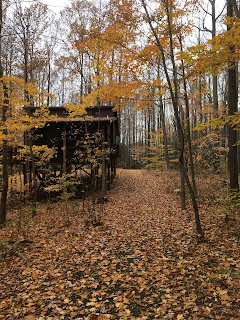From No Boundary:
________________________
Perhaps we can approach this fundamental insight of the mystics—that there is but
one immortal Self or Witness common in and to us all—in this way. Perhaps you, like most people, feel that you are basically the same person you were yesterday. You probably also feel that you are
fundamentally the same person you were a year ago. Indeed, you still seem to be the
same you as far back as you can remember. Put it another way: you never remember a time when you weren’t you. In other words,
something in you seems to remain untouched by the passage of time. But surely your body is not the same as it was even a year ago. Surely also your sensations are different today than in the past. Surely, too, your memories are on the whole different today than a decade ago. Your mind, your body, your feelings—
all have changed with time. But something has not changed, and you know that something has not changed. Something feels the same. What is that?
This time a year ago you had different concerns and basically different problems. Your immediate experiences were different, and so were your thoughts. All of these have vanished, but something in you remains. Go one step further. What if you moved to a completely different country, with new friends, new surroundings, new experiences, new thoughts. You would still have that basic inner feeling of I-ness. Further yet, what if you right now forgot the first ten years, or fifteen years, or twenty years of your life? You would still feel that same inner I-ness, would you not? If right now you just temporarily forget
everything that happened in your past, and just feel that pure inner I-ness—has
anything really changed?
There is, in short, something within you—that deep inward sense of I-ness—that is
not memory, thoughts, mind, body, experience, surroundings, feelings, conflicts, sensations, or moods. For
all of these have changed and can change without substantially affecting that inner I-ness.
That is what remains untouched by the flight of time—and that is the transpersonal Witness and Self.
Is it then so very difficult to realize that every conscious being has that same inner I-ness? And that, therefore, the overall number of transcendent I’s is but one? We have already surmised that if you had a different body you would still basically feel the same I-ness—but that is already the very same way every other person feels right now. Isn’t it just as easy to say there is but one single I-ness or Self taking on different views, different memories, different feelings and sensations?
And not just at this time, but at all times, past and future. Since you undoubtedly feel (even though your memory, mind, and body are different) that you are the same person of twenty years ago (not the same ego or body, but the same I-ness), couldn’t you also be the same I-ness of two-hundred years ago? If I-ness isn’t dependent upon memories and mind and body, what difference would it make? In the words of physicist Schroedinger, "It is not possible that this unity of knowledge, feeling and choice which you call your own should have sprung into being from nothingness at a given moment not so long ago; rather this knowledge, feeling and choice are essentially eternal and unchangeable and numerically one in all men, nay in all sensitive beings. The conditions for your existence are almost as old as the rocks. For thousands of years men have striven and suffered and begotten and women have brought forth in pain. A hundred years ago, perhaps, another man sat on this spot; like you he gazed with awe and yearning in his heart at the dying light on the glaciers. Like you he was begotten of man and born of woman. He felt pain and brief joy as you do. Was he someone else? Was it not you yourself?"
________________________
Let us walk in the holy presence.













